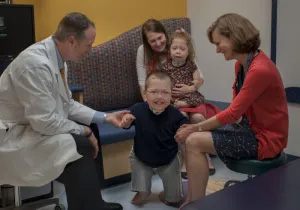Centralizing Care, Creating Cohesive Medical Guidelines for Skeletal Dysplasias
 Within the Skeletal Health Program at Seattle Children’s – the only one of its kind in the Pacific Northwest – a team of specialists provides innovative medical care and research that improves function and quality of life for children with rare bone diseases.
Within the Skeletal Health Program at Seattle Children’s – the only one of its kind in the Pacific Northwest – a team of specialists provides innovative medical care and research that improves function and quality of life for children with rare bone diseases.
The multidisciplinary care team includes orthopedists, geneticists, endocrinologists and radiologists, all collaborating at one location. Children with skeletal dysplasias and metabolic bone disorders are diagnosed and treated in the same place that they receive infusions, bone density scans and rehabilitation – and where providers are leading clinical trials that not only treat patients’ symptoms but also lead to improved long-term outcomes.
A Team-Based Approach
“There are only a few other programs like ours in the country that provide the same level and breadth of care,” says Dr. Klane White, director of Seattle Children’s Skeletal Health Program and associate professor in the Department of Orthopedic Surgery and Sports Medicine at UW Medicine. White notes that the program is nationally and internationally known for its expertise in areas such as dwarfism. “What really makes our center unique is that we make sure patients have all their needs met in a scenario that is essentially one-stop shopping.”
On average, patients see two physicians at each visit. Those physicians then meet weekly with the rest of the team to discuss patients’ needs and to get input from all specialists who are or will be involved in their care, before working with patients, their families and their pediatricians to create a robust care plan.
The program further supports patients and their families through close relationships with organizations such as the Little People of America, on whose Medical Advisory Board White currently serves.
The Skeletal Health Program also offers diagnostic and counseling services to pregnant mothers whose ultrasounds suggest a skeletal dysplasia.
Research Initiatives Focused on Patients’ Quality of Life
White and his team in the Skeletal Health Program have conducted novel research into treatments for osteogenesis imperfecta and various forms of mucopolysaccharidoses (MPS).
For example, the team was one of the first to demonstrate that pamidronate infusions improve quality of life and allow a more active lifestyle, in addition to the medication’s documented benefits for bone strength. The center was also the only pediatric orthopedic department in the country with a primary investigator leading clinical trials related to enzyme-replacement therapy for MPS IV and its impact on pain reduction and improved lung function and mobility.
Upcoming clinical trials will research growth parameters in and potential new therapies for children with achondroplasia and those with X-linked hypophosphatemic rickets.
Establishing Treatment Guidelines
White and fellow Seattle Children’s pediatric orthopedist Dr. Michael J. Goldberg were founding members of the Skeletal Dysplasia Management Consortium, an international group of physicians and researchers that established care guidelines for rare disorders, such as foramen magnum stenosis in infants with achondroplasia, perioperative care in patients with skeletal dysplasia and perinatal care in skeletal dysplasia.
“We develop these care guidelines where there is a relative absence of reliable evidence-based medicine,” White says. “Participating in clinical trials and developing medical guidelines are how we promote knowledge for these rare bone disorders.”
Call 206-987-7777 for provider-to-provider patient consults and visit our Skeletal Health Program to learn more.